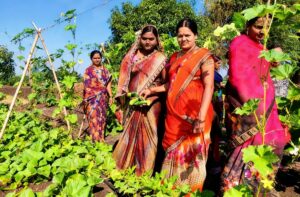When women are empowered, their families, children, the next generation, and their communities are empowered, too.

Women constitute half of Bangladesh’s 160 million human resources. About two-thirds (53 million) of them live in rural areas and eke out livelihoods from agriculture. More than half of the country’s agricultural labor force are women. They are involved in all agricultural activities, although most common activities are postharvest operations, homestead production, and livestock and poultry raising.
With growing rural outmigration, women’s role in agriculture is increasing. They contribute significantly to rural economy, and their empowerment is crucial to minimizing poverty and hunger.
Compared to men, women farmers face many obstacles. Empowering women farmers requires an understanding of their constraints and implementing targeted interventions for addressing these restrictions. These include land ownership and rights, access to improved varieties and technologies, extension and credit services, inputs such as seeds and fertilizers, farm machines and mechanization services, and knowledge and information. They also have limited decision-making power and participation in economic opportunities. These obstacles not only limit their productivity but also prevent women from achieving their full potential. As a result, women suffer more from poverty, food insecurity, and malnutrition.
Overcoming these obstacles will provide alternatives to improve their livelihoods. Studies have shown that, compared to the men, women are more likely to spend their income providing better nutrition, education, and health for their families.
The project, Unlocking the production potential of polder communities in coastal Bangladesh through improved resource-efficiency and diversifies cropping systems (SIIL-Polder) in Bangladesh, has a strong gender component. Funded by the Feed the Future Sustainable Intensification Innovation Lab, the project emphasizes gender equality and women empowerment. The goals of the project are to reduce their workloads, raise their agricultural productivity, increase their economic opportunities, and give them control over resources.
These objectives are deemed to be achieved through strategies such as identifying women farmers’ constraints and viable options for interventions; carrying out initiatives to enhance women farmers’ access to technologies and services; training women on improved crop production, processing, and marketing skills; and establishing and nurturing women producers and marketing groups.
Through a community approach, women farmers can buy high-quality seeds and inputs at lower prices. Collective production, processing, and marketing will allow them to receive higher profit for their produce because they will increase their access to different markets, reduce their transaction cost, and increase their bargaining power.
The SIIL-Polder project will leverage women’s groups to educate rural women on improved farming and nutritious diets. Besides, the robust evidence generated by the project will help design women-inclusive programs and policies. By earning income, women will gain decision-making power and economic autonomy in the family, which will empower them. When women are empowered, their families, children, the next generation, and their communities are empowered, too.
Dr. Bhandari is an IRRI socioeconomist. Dr. Minj is the director of BRAC’s Community Empowerment Program. Dr. Begum is the deputy director of the Department of Agricultural Extension in Bangladesh. Dr. Sarker is SIIL regional coordinator.






